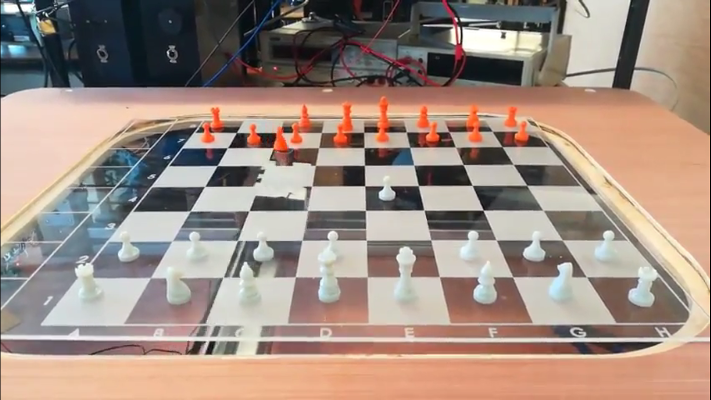While chess had long been a domain where humans were superior to computers, the balance has shifted quite substantially in the computers’ favor. But the one thing that humans still have control over is the pieces themselves. That is, until now. A group has built a robot that both uses a challenging chess engine, and can move its own pieces.
The robot, from creators [Tim], [Alex S], and [Alex A], is able to manipulate pieces on a game board using a robotic arm under the table with an electromagnet. It is controlled with a Raspberry Pi, which also runs an instance of the Stockfish chess engine to play the game of chess itself. One of the obvious hurdles was how to keep the robot from crashing pieces into one another, which was solved by using small pieces on a large board, and always moving the pieces on the edges of the squares.
This is a pretty interesting project, especially considering it was built using a shoestring budget. And, if you aren’t familiar with Stockfish, it is one of the most powerful chess engines and also happens to be free and open-source. We’ve seen it used in some other chess boards before, although those couldn’t move their own pieces.
















a noisy ghost.
Fancy a quiet game of chess? Thought not. :-)
As it was the old and original Milton Bradley Phantom Chess Computer. Circa 198? ?
But it worked!
I’d suggest dropping the level of the music by about 3dB, as it’s difficult to hear the voice-over at times.
Would be cool if instead of placing the opponents piece from the screen, it ran a quick sub-routine that scanned the board for changes before the “ghost’s” turn. Like scan each line with the electromagnet deactivated, using it as a sensor for where the piece induces a current from the magnets below to create a map. Then compare to the previous scan to see which piece was moved.
Seriuosly, how about a ghost keyboard playing ghost music only ghosts can hear ?
Reverse the polarity of the electromagnet to flip the king on its side for checkmate.
Could be done without robot arm: https://hackaday.com/2014/04/23/micro-robots-are-scary-awesome/ http://spritesmods.com/?art=magnmicrobots
They made a consumer version of this in the mid-80’s, too. Phantom Force, I think. It was really neat. Nice job on your build.
Phantom chess is not a new concept but it’s great seeing more and more DIY implementations.
What’s fascinating to me is: Computer chess boards from the 1980’s are still very tough. And as most chess boards from the era are stand alone they are still perfectly playable.
This remembers me “El ajedrecista”, created by Leonardo Torres Quevedo at 1912. Its logic was built entirely with relays, and, of course, was quite simple: it played only “king against king and rook”, but for the time it was impressive. It also had a gramophone that said “jaque mate” (check mate) when the machine won, and detected illegal moves.
Unfortunately, as usual in Spain, he had very little recognition in its own country :'(
https://www.youtube.com/watch?v=YoZ389Rs5s8
Ops… I mean “in HIS own country”… Sorry, Mr. Torres-Quevedo O:-)
That’s amazing!! Thanks for sharing
I absolutely love the thick aluminum profiles used and the general CNC level of beefyness to move 1 gram pieces around it’s so good.
“A group has built a robot that both uses a challenging chess engine, and can move its own pieces.”
So now Hackaday considers robots to be ghosts? Who is your target audience these days since it’s clearly no longer technically-minded people.
I think it is called humor.
Ironically, technically-minded people have LOTS of humor. Hence the ghost here …
Lol really?? Pretty sure they didn’t actually mean ghosts like spirits…they used the term “ghost” as the pieces move by themselves seemingly. Same as a “bug” in the code does not actually mean a bug lol stop taking everything so serious life to short
Next time use CoreXY setup!!! It’s ideal for stuff like this. That would have simplified the robot, could have used only two motors to make it more compact!
Does the author have any thoughts on Alpha Zero.
Is the author worried by any possible threat from artificial intelligence.